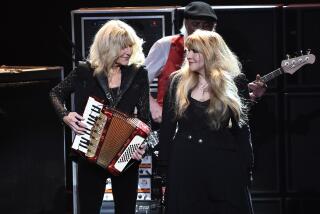Stevie Nicks in Flap With IRS
Stevie Nicks has good reason not to stop thinking about tomorrow: a looming Internal Revenue Service tax dispute.
The IRS is seeking $85,887 in additional taxes from the former Fleetwood Mac singer, saying she improperly took about $270,000 in business expense deductions for makeup, hair styling, clothes, a home office and management fees, according to U.S. Tax Court papers reviewed by The Times.
Among the expenses in dispute: $43,291 for clothes worn during performances, expenditures a Nicks lawyer in court documents defends as necessary because âmuch of this clothing is discarded immediately after use because it simply cannot be reused, given the energy levels of [Nicksâ] performances and the heat generated on stage from lights and physical exertion.â
The case highlights an often murky tax question in the entertainment business: What can artists and performers reasonably claim is necessary to maintain carefully cultivated images?
Over the years, Nicks has projected a gypsy-like persona on stage. In her tax papers, lawyer George G. Short of Santa Barbara argues that her hair and clothing âmust be themed to each performance, is not suitable for ordinary wear and is not adaptable to [Nicksâ] general or continued use.â She is required âto maintain a stage persona and appearance which is unlike her everyday persona and appearance.â
Short adds, âWhen not performing, [Nicksâ] makeup and hair-styling needs are minimalâ so she doesnât claim them as a business expense then.
The Nicks case stems from an audit of her 1991 tax return. It has recently come to light in public documents, the result of her decision to appeal the case last month to Tax Court in Alexandria, Va. The majority of such tax disputes are rarely made public because they are usually settled in the early stages.
Nicks, whose real name is Stephanie, was virtually unknown until she joined Fleetwood Mac in the mid-1970s just before the groupâs career rocketed. With such albums as âFleetwood Macâ and âRumours,â the band became one of the biggest-selling rock groups of all time, recording such hits as âRhiannon,â âOver My Head,â âDreamsâ and âDonât Stop,â which became the anthem of President Clintonâs 1992 presidential campaign.
Nicks also appeals $119,291 claimed as a business expense for payments to her personal manager, along with an additional $33,750 to write off an investment she made in the album âBuckingham-Nicks,â which she and fellow Fleetwood Mac member Lindsey Buckingham jointly financed in 1974. That album was overshadowed by the success of Fleetwood Macâs albums, court papers say, and the two decided in 1991 to abandon any efforts to continue to promote it.
Nicks also disputes an IRS decision disallowing $50,160 in expenses to maintain a business office in her Arizona home. In the petition, Short argues that Nicks used the office to compose songs, talk with advisors and executives and conduct her business as a songwriter and performer.
Finally, Short argues that Nicks also must spend money on private security services because she can attract unwanted attention âwhich disturbs and interrupts her trade, both while working from her home and when traveling on business.â
Short declined to comment on the case beyond what he wrote in court papers.
An IRS spokesman said the agency does not comment on pending cases.


